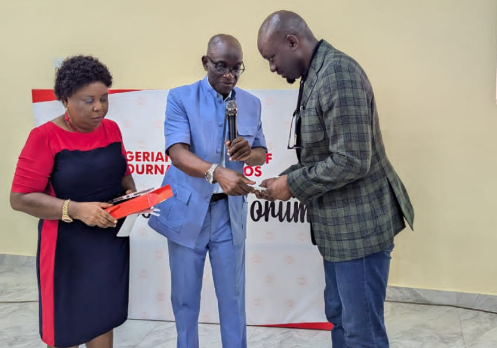By Jemimah Wellington, JKNewsMedia Reporter
AS ARTIFICAL INTELLIGENCE (AI) steadily integrates into various industries, its influence on journalism has sparked both fascination and concern.
Founder of TheCable and columnist at THISDAY, Simon Kolawole, addressed these developments at the Nigerian Institute of Journalism (NIJ) professional forum held in Lagos on February 5, 2025.
Kolawole, a media entrepreneur with vast experience, urged media professionals to adapt to AI technologies rather than resist them.
His message was clear and concise: “those who fail to evolve alongside these advancements risk becoming irrelevant.”
The ace journalist also detailed how AI systems are reshaping not only the way news is created but also how it is consumed.
He described AI’s capabilities in processing data, learning patterns, and making decisions autonomously with minimal human involvement.
“AI is already here,” Kolawole remarked. “Many people don’t realise they interact with AI daily — whether it’s using predictive text on a phone or receiving Netflix recommendations.”
He pointed out that AI in its simplest form includes reactive machines, such as Netflix’s recommendation engine, while more sophisticated systems are starting to understand emotions and potentially display consciousness.
Addressing the growing role of AI in newsrooms, Kolawole highlighted AI’s applications in news writing, fact-checking, and data analysis.

The rise of generative AI tools like ChatGPT has caused a stir in journalism circles, with some fearing job losses while others view AI as an enhancement to journalistic efforts.
Kolawole emphasised that many media outlets are already using AI-powered chatbots to engage with readers, while routine tasks like writing financial reports, sports summaries, and weather updates are increasingly automated.
“AI is changing the way we do research. What once took hours in libraries now takes mere seconds through a Google search,” he noted.
However, Kolawole also raised important ethical concerns.
While AI-driven personalisation of news feeds enhances engagement, it can also create “filter bubbles,” wherein audiences are exposed only to stories that reinforce their beliefs.
He cautioned that AI systems, based on existing data, may inherit biases, leading to distorted or skewed decisions.
These concerns were further compounded by AI’s potential role in spreading misinformation, with Kolawole stressing that AI-generated content could contribute to the increasing difficulty of distinguishing truth from fiction.
Job displacement due to automation in journalism was another issue raised.
Kolawole acknowledged that AI is taking over more routine functions but reassured the audience that journalists remain indispensable for their critical thinking and ability to hold power accountable.
Despite the shift towards automation, human journalists’ skills in analysis, empathy, and judgment will continue to be irreplaceable.
In his presentation, Kolawole stressed the pressing need for Africa to adopt AI technologies proactively.
“The Western world is leading in AI development, and Africa cannot afford to play catch-up,” he asserted.
He encouraged journalists across the continent to integrate AI tools into their workflow for research, fact-checking, and data analysis.
Yet, he also warned that human intelligence must ensure that AI supports journalism’s core mission of truth and accountability.
Kolawole’s remarks were backed by the NIJ’s commitment to improving technological literacy in journalism.
NIJ Provost, Gbenga Adefaye, spoke on the importance of integrating technology into the curriculum, pointing out that the world has moved past the era of traditional, analogue methods.
Although the curriculum does not yet include specific AI courses, it is evolving to include more Information Communication and Technology (ICT) content, meeting the requirements of the National Board for Technical Education (NBTE).
The forum also served as a platform to discuss the risks of AI in media, such as plagiarism and misleading interpretations of news.
Kolawole mentioned recent incidents where AI-driven analysis led to erroneous claims, like misrepresentations of geographical facts regarding Lagos ports.
His discourse emphasised the critical need for journalists to maintain ethical standards, regardless of technological advancements.
The event was attended by several notable figures, including Patricia Kalesanwo, the NIJ registrar, and Dele Omojuyigbe, a former deputy provost.
The forum also provided a valuable space for students to engage with AI’s role in media, with Kolawole’s award of recognition acknowledging his invaluable contribution to the ongoing discourse on AI’s place in journalism.





